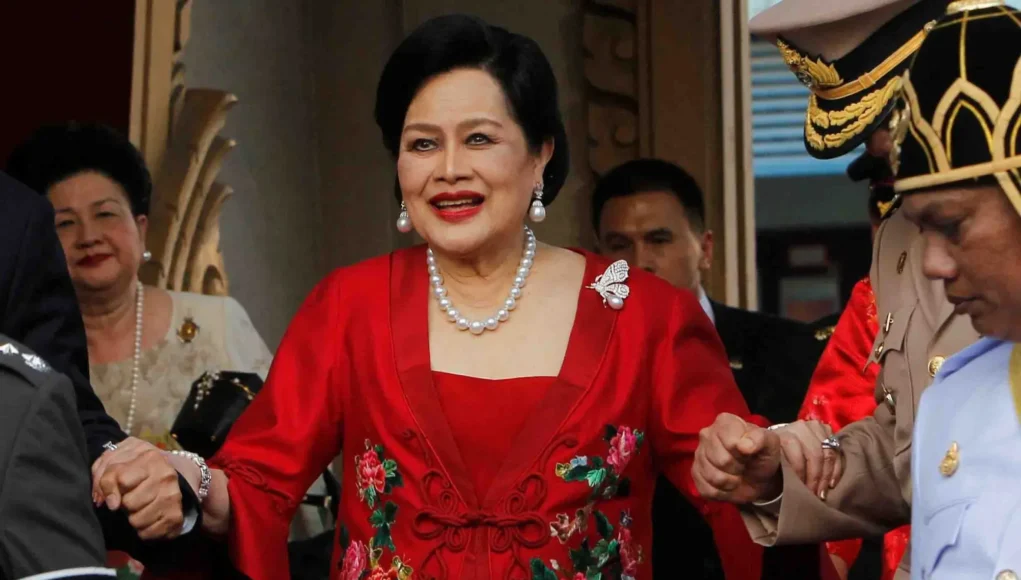BANGKOK, Oct 25 — Thailand’s Queen Mother Sirikit, who brought glamour and grace to the country’s postwar monarchy and was widely revered as the “Mother of the Nation,” has died at the age of 93, the Royal Household Bureau announced on Saturday.
The palace said Sirikit had been hospitalised since 2019 due to several illnesses and developed a bloodstream infection on October 17 before passing away late on Friday at Chulalongkorn Hospital in Bangkok.
Sirikit had been out of the public eye since suffering a stroke in 2012.
A year-long mourning period has been declared for members of the royal family and household. Public offices will fly flags at half-mast for a month, and government officials have been asked to observe mourning for one year. Entertainment venues have been requested to suspend activities for a month.
Prime Minister Anutin Charnvirakul cancelled his upcoming trips to the ASEAN summit in Kuala Lumpur and the APEC summit in South Korea following the Queen Mother’s passing. He said he would travel briefly to Malaysia on Sunday to sign a ceasefire agreement with Cambodia before returning to Thailand.
A Symbol of Elegance and Devotion
Sirikit’s husband, King Bhumibol Adulyadej (Rama IX), was Thailand’s longest-reigning monarch, with 70 years on the throne from 1946 to 2016. Throughout their marriage, Sirikit was his constant companion and a central figure in Thailand’s royal revival, admired both at home and abroad for her style, grace, and charitable works.
When the royal couple travelled overseas, Sirikit captivated global audiences. During a 1960 visit to the United States — which included a state dinner at the White House — Time magazine called her “svelte” and “archfeminist,” while the French daily L’Aurore described her as “ravishing.”
Born in 1932, the same year Thailand transitioned from an absolute to a constitutional monarchy, Sirikit Kitiyakara was the daughter of Thailand’s ambassador to France. While studying music and languages in Paris, she met the future King Bhumibol, who had spent much of his youth in Switzerland.
“It was hate at first sight,” she once recalled in a BBC documentary. “Then it was love.”
They married in 1950, when Sirikit was just 17. Known for her flair for fashion, she collaborated with French couturier Pierre Balmain on designs that showcased Thai silk, helping to revive and popularise the nation’s traditional weaving industry.
Champion of the Rural Poor
For more than four decades, Sirikit travelled with King Bhumibol to remote rural areas, spearheading development projects to improve living standards among Thailand’s poor. Their efforts were broadcast nightly on the Royal Bulletin, reinforcing their image as a caring royal couple dedicated to their people.
In 1956, Sirikit briefly served as regent while her husband entered a Buddhist temple to be ordained as a monk — a rite of passage for Thai men.
Her birthday, August 12, was later declared Mother’s Day and a national holiday, a reflection of her maternal symbolism in Thai society.
When Bhumibol passed away in 2016, the nation entered a year of mourning. Upon her son King Maha Vajiralongkorn’s (Rama X) coronation in 2019, Sirikit assumed the title of Queen Mother.
Occasional Forays into Politics
Though Thailand’s monarchy is constitutionally above politics, Sirikit occasionally made statements or appearances with political resonance.
In 1998, she used her birthday address to urge unity behind then-Prime Minister Chuan Leekpai, undermining an opposition bid for a no-confidence vote.
Later, she was associated with the royalist People’s Alliance for Democracy (PAD), whose protests against pro-Thaksin Shinawatra governments culminated in political upheaval during the 2000s. In 2008, she attended the funeral of a PAD protester killed in clashes with police — a move widely interpreted as tacit royal support for the group.
A Nation in Mourning
Mourners dressed in black gathered outside Chulalongkorn Hospital on Saturday, laying flowers and expressing grief at her passing.
“When I learned the news, my world stopped,” said Maneenat Laowalert, a 67-year-old Bangkok resident. “I had flashes from the past of all the things that Her Majesty has done for us.”
For many Thais, Sirikit will be remembered as a symbol of maternal virtue and national devotion — a figure whose influence spanned decades of Thailand’s turbulent modern history.
Her body will lie in state at the Grand Palace’s Dusit Thorne Hall, where members of the public are expected to pay their respects in the coming days.
Sirikit is survived by her son, King Vajiralongkorn, and her three daughters.







































